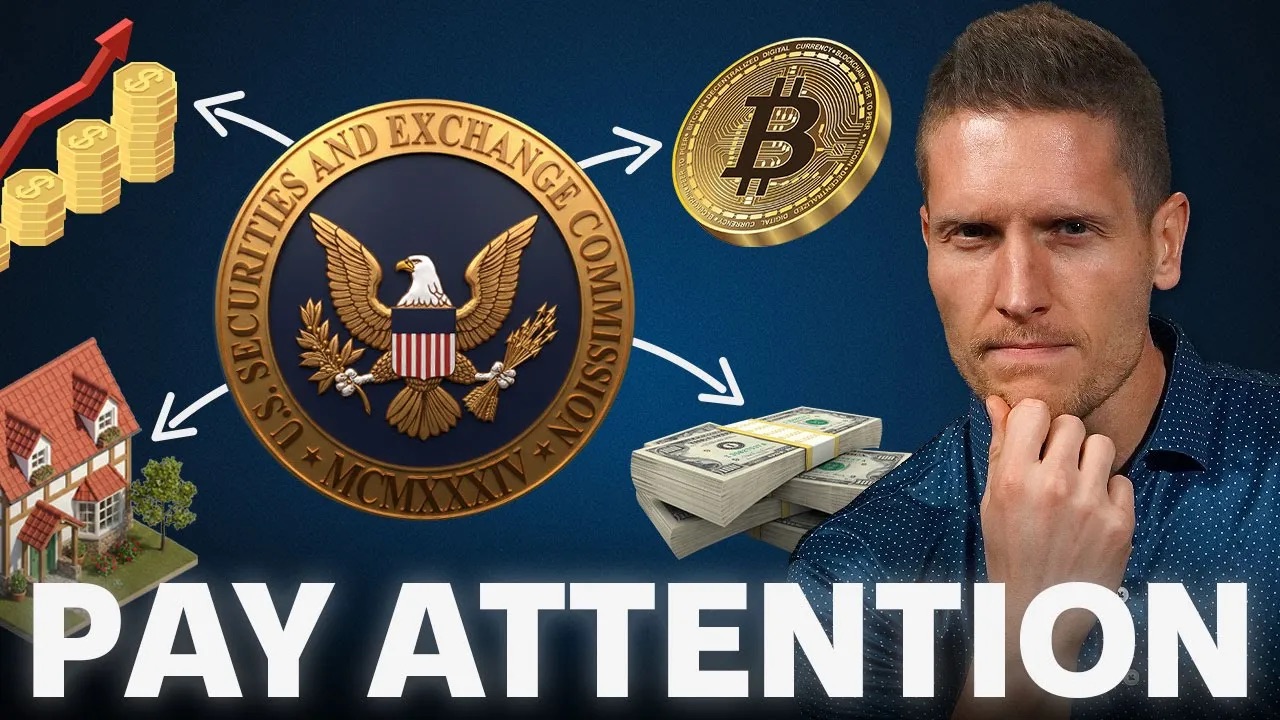We got a great question from QC up next. He says, ‘Does it matter if you invest in mutual funds versus ETFs in a taxable brokerage?’ I picked this one because recently, I think it was last year or the year before, there was a big news story about one of the big providers, and a lot of people owned mutual funds in their taxable brokerage account, and it caused a lot of tax consequences. So can you guys talk about that?’
Yes, so one of the questions that people probably ask is, ‘What are the differences in mutual funds and ETFs, and when you kind of dive into those differences, well, does it make sense to hold different types in different types of accounts?’ Now, the one thing I’ll say, Brian, as you answer this question is that it’s important. Not all are created equal. Not all mutual funds are just the exact same. Some of them are more tax-efficient, some of them are less tax-efficient. But maybe talk a little bit about the differences in mutual funds and ETFs and can you hold them in a taxable account? Is one better than the other?
Yeah, first, mutual funds are a basket of funds, and they typically have stocks, bonds, or whatever the manager is putting in them. It’s true that they run either embedded losses or embedded gains. And since markets are typically up, you know, eight out of 10 years, there’s typically more likely embedded gains. And then you have to pay attention to what’s called turnover ratio, meaning how often is the manager or the portfolio inside of there being traded by and selling, because every time you buy and sell, that creates a taxable transaction. This is one more reason why we love index funds versus active management. Index funds just don’t have a lot of turnover. Just naturally, the only turnover is when they take off whatever companies now fell outside of the top 500. Those come off, and they add whatever the five new ones that kind of grew into the S&P 500. That’s the turnover. Very low percentage. Not a lot of transactions from that, so you just don’t spit out a lot of income when you’re doing index investing.
Now, that’s kind of… I told you, active management is going to have a lot of turnover, so it’s probably going to be less tax-efficient. Index funds don’t have as much turnover, so they’re going to be much more efficient. But then there’s also now you’ve got mutual funds versus ETFs. Well, ETFs are naturally indexes, so they’re already tax-efficient. But they also, instead of it being embedded inside out of the portfolio, it’s a natural flow-through process.
So what I always tell people is, because when markets are getting their teeth kicked in, sometimes it’s better. Mutual funds can actually have embedded losses. That’s actually going to provide a tax tailwind, meaning that you could actually have gains within the portfolio that you’re not going to pay taxes until it makes back those losses and then gets into gain territory. And you have to look at the timing. So I would encourage you to use tools like Yahoo Finance, Morningstar. You can start looking at mutual funds and see what they have in embedded gains and losses. Use that as your guiding factor. If you’re kind of at the end of the year, I’m talking about the fourth quarter, and you’re worried about those November and December capital gain and income distributions that will flow through, usually and get dumped out at the end of the year, ETFs are much more consistent on not dropping those tax bombs on you.
I know, in 3 minutes, I just loaded them up, but I mean that’s kind of the way I’d handle it. We just did a full Q&A or almost a mini-show in three minutes. Only thing that I would add to that is, early on in your investing journey, I wouldn’t get lost in those details as much, right? I think if you’re just starting out, it matters more about how much you are saving than what you’re saving into. It’s one of the reasons we talk about loving low-cost Target Retirement Index funds, where all you’ve got to do is decide two things: When do I think I’m going to need the money? How much can I save? If you can answer those two questions, you can just start plowing it in, whether it’s in your Roth, your 401(k), or your after-tax brokerage account, and let those dollars build up.
You shouldn’t really worry about the taxability of those at that stage. I think that’s what Daniel was referencing. There’s a big fund company. One of their target retirement funds a couple of years ago had huge capital gain distributions. Well, that’s less than ideal. But again, in the beginning of your journey, focus on the things that have the biggest impact. And the thing that has the biggest impact at the early part of your journey is your savings rate. So don’t major in the minors early on. Buy a low-cost index fund, buy low-cost Target Retirement Index funds, or use low-cost ETFs, and I think you’re going to likely set yourself up for long-term success.
You came back to it perfectly. That is when we say low-cost Target Retirement funds, we prefer the index variety of Target Retirement funds because they are tax-efficient. They’re super low cost. Here’s what I also say about the timing. If you were buying at the beginning of the year, look at those embedded gains and losses and use that as your guiding factor. If you’re kind of at the end of the year, I’m talking about the fourth quarter, and you’re worried about those November and December capital gain and income distributions that will flow through, usually and get dumped out at the end of the year, ETFs are much more consistent on not dropping those tax bombs on you. I know we, in 3 minutes, I just loaded them up, but I mean that’s kind of the way I’d handle it. We just did a full Q&A or almost a mini-show in three minutes.
The only thing that I would add to that is, early on in your investing journey, I wouldn’t get lost in those details as much, right? I think if you’re just starting out, it matters more about how much you are saving than what you’re saving into. It’s one of the reasons we talk about loving low-cost Target Retirement Index funds, where all you’ve got to do is decide two things: When do I think I’m going to need the money? How much can I save? If you can answer those two questions, you can just start plowing it in, whether it’s in your Roth, your 401(k), or your after-tax brokerage account, and let those dollars build up.
You shouldn’t really worry about the taxability of those at that stage. I think that’s what Daniel was referencing. There’s a big fund company. One of their target retirement funds a couple of years ago had huge capital gain distributions. Well, that’s less than ideal. But again, in the beginning of your journey, focus on the things that have the biggest impact. And the thing that has the biggest impact at the early part of your journey is your savings rate. So don’t major in the minors early on. Buy a low-cost index fund, buy low-cost Target Retirement index funds, or use low-cost ETFs, and I think you’re going to likely set yourself up for long-term success. For more information, check out our free resources.













